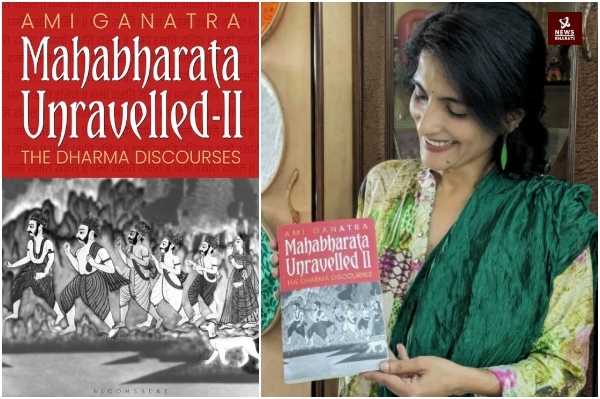Mahabharata Unravelled II | Book Review
Total Views |
For a few months, I have not written any book reviews due to some other preoccupations. I just tweet my views. However, Mahabharata Unravelled II needs to be talked about because it is one of the most important books in recent times when books on Dharma, our civilisation, history, and scriptures are flooding the market. Many writers have fictionalised our eternal historical immortals like Ramayan and Mahabharat, both by believers, modernists, and the seculars who try to view our history in modern context.

I read one book on Mahishasur last year that left me shell shocked though the writer believed that she had only re-interpreted the story of Mahishasur and Durga. I read another fiction on Ramayana’s Lanka kand that left me highly disappointed. It had turned around the entire idea of a mortal human being, Maryada Purushottam Ram, battling it out with a superhumanly powerful Ravana by organizing ordinary tribals and winning the war against demonic forces. It showed Ram being helped by his brothers Bharat and Shatrughan with their powerful forces, thus defeating the very premise of Ramayan.
Author Ami Ganatra does nothing like this with immortal stories like Ramayan and Mahabharat. She tells the story as it is, explaining it in a modern context to the new generation but not compromising on the story and its characters one bit. That is her strength.
Her latest book Mahabharata Unravelled II is not an extension of the first volume. It is a careful compilation of lessons that are spread over Mahabharata in different places. For an ordinary reader, who is busy reading the story, these lessons are lost sometimes because she/he is busy absorbing the complex multi-starrer story with plots within plots complex narration. It is a distillation of the wisdom of Mahabharata.
Author covers the discourses by the dominating powerful Bhishma, Devarishi Narada, sagely but uncompromising Prime Minister Vidur and King Prahlad, Kaama Geeta, Vyadha Geeta and the famous Yaksha Prashnas answered by Yudhishthir. In the last part she also presents the wonderful story of ascent of Pandavas to Swarga that explains why Yudhishthir was considered Dharmaraj despite his critical mistakes. You will be deeply touched by the story and discourses of the meat seller called Dharmavyadha.
When you read her enunciation of Aapada Dharma, you are fascinated by the timelessness of the teachings and genius of Maharshi Veda Vyas. You feel as if the teachings of these great rishis and kings were written for today’s world.
Skill of the writer is in compilation of various discourses in thematic form, presenting the meanings of various shlokas and stories in a simple to understand English without compromising on the meaning in any way. She does not try to sound modern by twisting or modifying any meaning. She simplifies but does not compromise with the meaning.
I close with a few of the lessons from Mahabharata; and you will realise why I commend this book for each and every Bharatiya.
Vidur says, “The name of the family is no testimony to character, only the person’s conduct determines his character. It is not wealth that defines nobility but good conduct and virtue. Hence, you should strive to protect your virtues. Wealth is volatile, it may come and go but virtue once destroyed, destroys the person himself.”
On statecraft, Vidur says, “Poison can kill only a person who drinks it, weapon can kill only a person who is hit. But one undesired leak from the office of the administrator can destroy the entire kingdom along with the king.”
Grand old warrior Bhishma tells Yudhishthir, “A king should have an eagle like vision to see far enough, a heron like focus on the target, the caution of a dog, the valour of a lion, the suspicion of a crow and the approach of a snake.”
Ami Ganatra has done us a favour by writing this book that could have been left unwritten and she could have happily based in the success of Mahabharat Unravelled I, a story well told. But she has taken the pain of writing volume II which could fail to attract readership. I am sure, this book has tasted success already. But as a Sanatani, I owed it to her to write this review.


